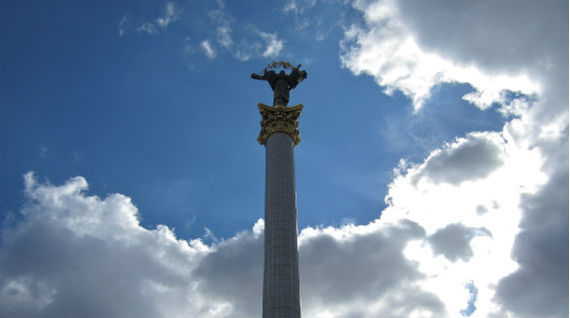The first time I heard the Ukrainian national anthem, "Ще не вмерла України," which roughly translates to "Ukraine has not yet Perished," I thought I had mistranslated. Watching the events around EuroMaidan unfold, however, I do not think there could ever be a more perfect title for a country's anthem.
The past two months have bore witness to small protests becoming massive, massive protests shrinking, journalists and activists becoming targets for lethal force, all bringing people back to Maidan Nezolezhnosti and cars to a number of locations during AutoMaidans across the country. Even with the incredible resilience of Euromaidan, the future Ukrainian democracy is becoming progressively unclear.
On January 16, referred to as Black Thursday, the Verkhovna Rada adopted a set of laws through a falsified vote that passed by a show of hands. There was no debate nor opportunity for members of parliament to so much as read the law before voting. When Viktor Yanukovych signed the law soon after, oppression became law in Ukraine and put into jeopardy all who voice dissent. The relatively strong civil society and independent media have been the cornerstones of democratic development, and these astoundingly vague laws seek to destroy the already weak Ukrainian democracy. Freedoms of speech, assembly, and press are greatly damaged by this law while any organization receiving support from non-Ukrainian citizens must register as a foreign agent. This infographic created by Chesno, a transparency focused NGO, outlines the worst aspects of the new laws.
What does this mean for democracy in Ukraine and those who fight for it?
Since becoming an independent state in 1991, there have been varying levels of freedom and conditions for activism as well as varying levels of international awareness of Ukrainian politics. Over the past week, the situation in Ukraine has spiraled from peaceful protestors using civil disobedience to mock the government into violence growing in the horrifying photos and videos that have renewed Western media's interest. Some have mocked Ukrainians wearing colanders and pots on their heads, without realizing these items were themselves mocking the new laws (and providing some protection from the real threat of blunt objects). More often though, the images of an icy wasteland punctuated by Molotov cocktails has dominated Western media coverage of protests with limited explanation of what is really happening on the ground.
All the time, the numbers are adding up -- hundreds have been injured, many seriously injured, and several people have been murdered by police. Reports of police going to hospitals to arrest injured protestors and of medical workers being shot by police while providing care have been some of the most alarming news coming from Kyiv. The line of the government has been that protestors are far-right extremists, but this is simply not true. While there is a segment of protestors who are affiliated with far-right party Svoboda and other similar organizations, protestors range in political affiliation and are from Kyiv to Chernivtsi to Kharkiv to Sumy. The protestors are standing for civil society, freedom of press, human rights, democracy, and Yanukovych's resignation, though they may have different ideas on how to achieve these goals.
As of writing this, eight oblast governments have been taken over by protesters and six more have masses of protestors attempting to take power. While a majority of these are in the western part of the country, there have been isolated protests throughout eastern Ukraine, which has traditionally supported Yanukovych's party. Opposition leaders met with Yanukovych on Saturday and rejected a deal that would grant them high level political positions and an offer to repeal parts of the new laws, among other things. Yanukovych is feeling pressure, but the administration is still using police force against protestors and will continue to do so as long as police and military comply.
While I personally want to see a much stronger response from the US and European community to remove the immense financial power of guilty members of Yanukovych's regime, it is important to remember where the physical power of the current regime lies -- in the police and security forces. On a number of occasions over the past two months, police and other security forces in Western Ukraine have refused to engage in violence against protestors. Even in Kyiv, there have been at least two instances of police backing down to protestors -- most recently on Saturday evening police left the Ukrainian House, which they had been occupying. Protestors do not appear to be giving up, but the police forces may be the first to give in. Through taking away the resources for Yanukovych to oppress citizens and abuse his power, both political and financial, Ukrainians have the greatest opportunity to achieve their demands.
Whether negotiations or elections or resignation brings peace to the streets remains to be seen, but Ukraine has not yet perished.
